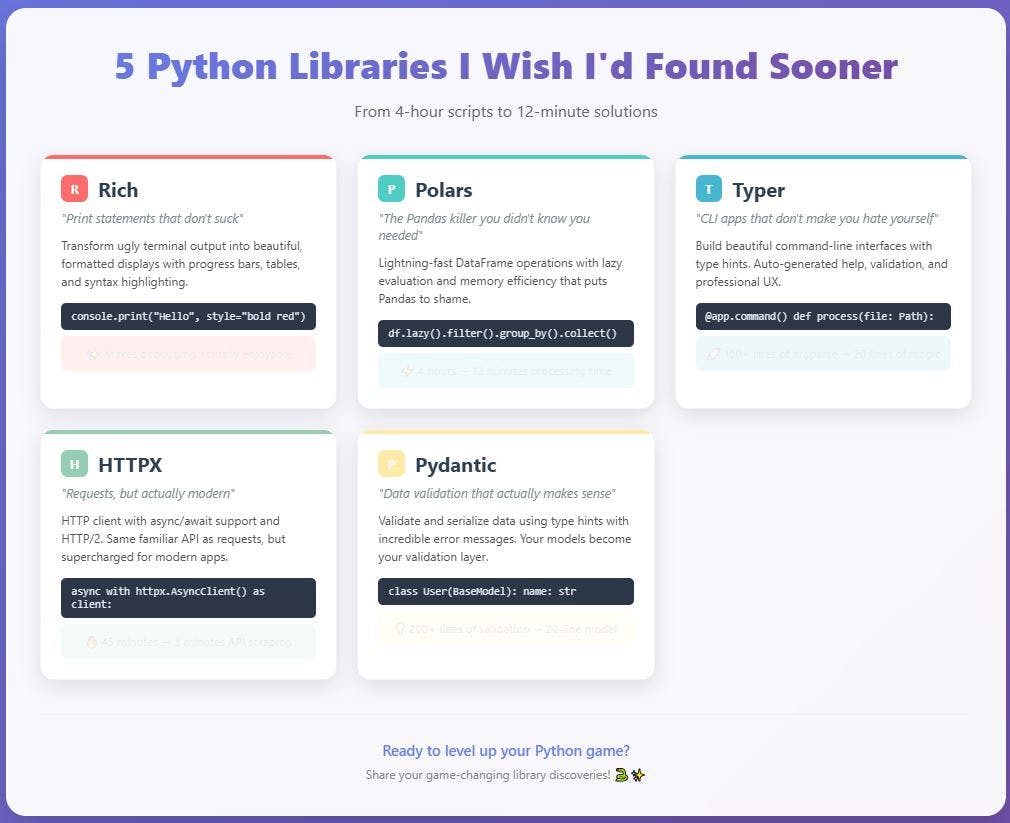Last month, I was debugging a particularly nasty data processing script that was taking 4 hours to run. Four. Hours. After discovering one library on this list, I got it down to 12 minutes.
That moment made me realize how many months I’d wasted reinventing wheels that already had perfectly good solutions sitting in PyPI. So here are five Python libraries that would have saved me countless late nights if I’d found them earlier.
1. Rich – Because Print Statements Don’t Have to Suck
What it does: Turns your terminal output from ugly text into beautiful, formatted displays.
For the longest time, I was that developer who debugged everything with print() statements. My terminal looked like a chaotic mess of text, and tracking down issues was like finding a needle in a haystack.
Then I discovered Rich.
from rich.console import Console
from rich.table import Table
console = Console()
Instead of ugly print statements
console.print("Hello", style="bold red") console.print("Processing data...", style="green")
Beautiful tables instead of messy lists
table = Table(title="User Data") table.add_column("Name", style="cyan") table.add_column("Status", style="magenta") table.add_row("John", "Active") table.add_row("Sarah", "Pending") console.print(table)
Why it’s a game-changer: Rich doesn’t just make things pretty (though it does that really well). It has progress bars, syntax highlighting, and even renders markdown in your terminal. My debugging sessions went from squinting at walls of text to actually understanding what was happening at a glance.
The “I wish I knew this sooner” moment: When I realized I could use rich.inspect() to explore any Python object with beautiful formatting instead of wrestling with dir() and vars().
2. Polars – The Pandas Killer I Didn’t Know I Needed
What it does: DataFrame operations that are faster than Pandas and use way less memory.
I was a loyal Pandas user for years. Until I had to process a 2GB CSV file and my script kept crashing with memory errors. A colleague mentioned Polars, and I figured I’d give it a shot.
import polars as pl
Reading large files? No problem.
df = pl.read_csv("huge_file.csv", lazy=True)
Chaining operations that would make Pandas cry
result = ( df .filter(pl.col("status") == "active") .group_by("category") .agg([ pl.col("revenue").sum().alias("total_revenue"), pl.col("user_id").count().alias("user_count") ]) .sort("total_revenue", descending=True) )
Only executes when you call collect()
final_result = result.collect()
Why it’s a game-changer: Polars is lazy by default, meaning it doesn’t execute operations until you tell it to. This lets it optimize the entire query chain. Plus, it’s written in Rust, so it’s absurdly fast.
The “I wish I knew this sooner” moment: Watching a 4-hour data processing job finish in 12 minutes. I literally thought something was broken.
3. Typer – Command Line Apps That Don’t Make You Hate Yourself
What it does: Creates beautiful CLI applications with minimal code and automatic help generation.
I used to build command-line tools with argparse, and it was… painful. So much boilerplate code just to parse a few arguments. Then I discovered Typer, and suddenly building CLI tools became fun.
import typer from pathlib import Path
app = typer.Typer()
@app.command() def process_file( input_file: Path = typer.Argument(..., help="Path to input file"), output_dir: Path = typer.Option("./output", help="Output directory"), verbose: bool = typer.Option(False, "--verbose", "-v", help="Verbose output") ): """ Process a file and save results to output directory. """ if verbose: typer.echo(f"Processing {input_file}...")
# Your processing logic here
typer.echo(f"✅ Done! Results saved to {output_dir}")
if name == "main": app()
Why it’s a game-changer: Type hints become your CLI interface. Typer automatically generates help text, validates inputs, and even gives you beautiful error messages. No more wrestling with argparse documentation.
The “I wish I knew this sooner” moment: Realizing I could build a professional-looking CLI tool in 20 lines of code that would have taken me 100+ lines with argparse.
4. Httpx – Requests, But Actually Modern
What it does: HTTP client that supports async/await and HTTP/2, while keeping the familiar requests API.
I was stuck in the requests mindset for way too long. Don’t get me wrong, requests is great, but when you need to make hundreds of API calls, the synchronous nature becomes a bottleneck.
import httpx import asyncio
Synchronous usage (just like requests)
response = httpx.get("https://api.example.com/data")
But the real magic is async
async def fetch_user_data(user_ids): async with httpx.AsyncClient() as client: tasks = [ client.get(f"https://api.example.com/users/{user_id}") for user_id in user_ids ] responses = await asyncio.gather(*tasks) return [r.json() for r in responses]
Fetch 100 users concurrently instead of sequentially
user_data = asyncio.run(fetch_user_data(range(1, 101)))
Why it’s a game-changer: Same familiar API as requests, but with async support when you need it. Plus, it handles HTTP/2 automatically, which can significantly speed up multiple requests to the same server.
The “I wish I knew this sooner” moment: Reducing an API scraping script from 45 minutes to 3 minutes just by switching from requests to httpx with async.
5. Pydantic – Data Validation That Actually Makes Sense
What it does: Validates and serializes data using Python type hints, with incredible error messages.
I used to write so much custom validation code. Checking if fields exist, validating types, handling missing data – it was exhausting and error-prone. Pydantic changed everything.
from pydantic import BaseModel, EmailStr, validator from typing import Optional from datetime import datetime
class User(BaseModel): name: str email: EmailStr age: int signup_date: Optional[datetime] = None
@validator('age')
def validate_age(cls, v):
if v < 0 or v > 150:
raise ValueError('Age must be between 0 and 150')
return v
This automatically validates everything
try: user = User( name="John Doe", email="not-an-email", # This will fail age=25 ) except ValidationError as e: print(e.json(indent=2)) # Beautiful error messages
Why it’s a game-changer: Your data models become your validation layer. No more manual checking, no more mysterious bugs from malformed data. Plus, it automatically generates JSON schemas for API documentation.
The “I wish I knew this sooner” moment: Deleting 200+ lines of custom validation code and replacing it with a 20-line Pydantic model that worked better.
The Real Lesson Here
These libraries all share something in common: they solve real problems that every Python developer faces, but in ways that feel almost magical when you first use them.
The bigger lesson? Don’t be afraid to explore beyond the “standard” libraries everyone talks about. Some of my biggest productivity gains have come from libraries I stumbled across in random GitHub repos or buried in someone’s requirements.txt file.
Also, read other people’s code. I found half of these libraries by browsing open-source projects and wondering “wait, what does that import do?”
What libraries have changed your development workflow? I’m always looking for the next game-changer, and the Python ecosystem never stops surprising me.
Have a library that deserves to be on this list? Drop it in the comments – I’m always hunting for tools that make Python development more enjoyable.










